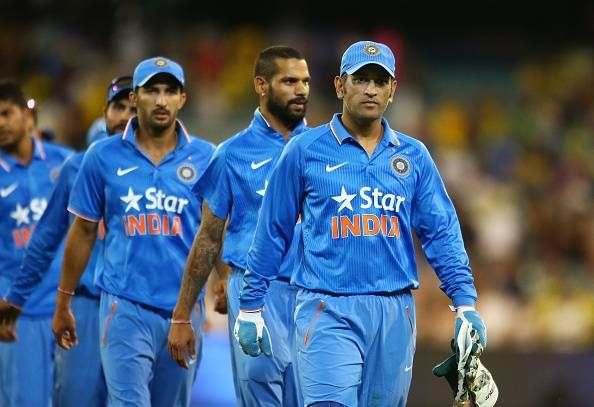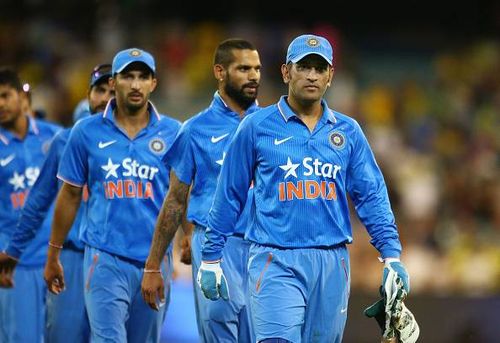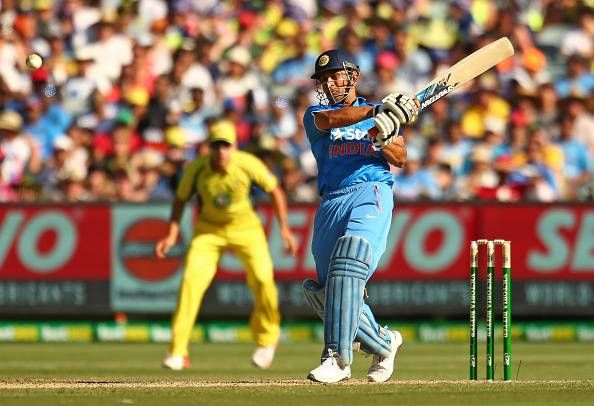
Why replacing MS Dhoni in limited overs cricket will be tough for India
When Australia lost their last wicket in the second VB series final in 2008, a relatively young, nonchalant captain walked towards the opposition players to calmly shake hands. Ian Chappell, who was commentating, remarked how MS Dhoni was a 'cool customer' as he had not even managed a triumphant smile.
Quietly jubilant in victory, nonplussed in defeat - that was India's new limited overs captain. A year earlier, he had taken an inexperienced side to be the top spot in the inaugural edition of the ICC World T20.
Yet there had been no emotional fireworks from India's newly crowned T20 skipper back then. No over the top celebration, no chest-thumping pride, just sedate acceptance of the moment of glory. India's new skipper was quite unlike one of his firebrand predecessors who had waved his shirt from the Lord's balcony.
Yet few would have backed him then to surpass the boy from Bengal who had taken his Team India to the threshold of ultimate glory in 2003.
Phenomenal record as a captain
As a captain, he has always been strange. But such was his élan that strangeness became his sword and unorthodoxy his quixotic method of achieving success. When the bat turned in his hand simulating a chopper's swish, a billion eyes swung in front of TV sets to follow the ball to the stands.
Quirky as a batsman, perhaps a little too crazy as a captain. He played his cards with the breath of fire but the quietude of a magician. And boy, did he play them well! Who else in his right mind would ask Joginder Sharma to bowl in that last over? Who else would walk in so early in a World Cup final when he is suffering from bad form.
No grandstanding, no fuss, that's Dhoni after all. When you die, you die, there's no better way. That has always been his cosmic mantra. And for the next few hours, he butchered the opposition with the finesse of an artist. Never has the world seen such violence and music, such butchery and art, come together in one man.
There's no tournament he has not won. There's no trophy that he has not claimed. But is that reason enough to calmly walk away into the sunset?
Decline, but not death
In the last 25 ODIs, he averages 38.21. All while doing the dirty work of trying to build when there are no batsmen after him. All while trying to finish games for his country. And who do you replace him with?
Almost all Indian wicket-keepers doing well in the domestic circuit are top order batsmen. Accumulators of runs, stylish builders of innings, a batsman one-too-many trying to burrow his way into the crowded top and middle order.
Grey-haired Indian cricket pundits had once sat back in their couch admiring Bevan as he took the Aussies to victory after victory. Only if we could have someone like him, they would have thought. But that was an idle dream until of course the man from Jharkhand with his long hair and nonchalant flamboyance arrived brandishing his bat-sword.
Still the best finisher?
The no. 7 is a cursed position for India now. Much like United still mourning Ronaldo's departure. Jadeja, Binny, Raina -- everyone has had a go. But in that position, everyone has come and gone. Walked back in disgrace, failed to replicate their successes.
The clamour for replacing Mahi is deafening now. But it's only an imbecile that fires his employees without a replacement. He had, in the last phase of his career, wanted more freedom. He had wanted to bat higher up the order and vacate his position to groom his successors.
But like it's said, the preciousness of a thing is felt only in its absence. Even Raina, such a swash-buckler, felt the curse of no. 7. As a finisher, he capitulated like a bag of bones, a failure that temporarily cost his place in the team. The SOS was triggered. Dhoni was soon back in his place, doing what he does every day. Finishing games. He has become irreplaceable as a finisher.
There's still time
As a famous TS Eliot poem repeats in a sing-song fashion: There will be time, there will be time. Yes, there will be time to trash Dhoni for his lost powers. But that time is not now. Maybe we should find someone who could replace him first. Till then, maybe we should not ignore how short public memory is and honour the man from the laurels he has brought home.
This is a man who knows when to walk. Not just to walk when he has nicked it - an action which once made the legendary Gilchrist great. But he knows when to take the waltz and when to embark on that long, lonely walk back. He knows, as he has shown us, when to walk away.
But this is a man who when he held the World Cup trophy realised a nation's dream. A generation that can perhaps die in peace with the thought that they have become world champions in their lifetimes.
The swagger is still not gone. His quiet command still deserves and demands respect. With his stoic nonchalance, his moves are still that of a master chess player. Or a quiet automaton writing poetry. His moves are simulated and rehearsed. He will know when the time comes.
When it comes, let us make his departure a memorable one. Slow withering and then the grand, final flourish of the virtuoso. We will know then. Everyone will know. No foreplay, just one spectacular, orgasmic death. As Caesar would say, heavens themselves blaze forth the death of princes.

